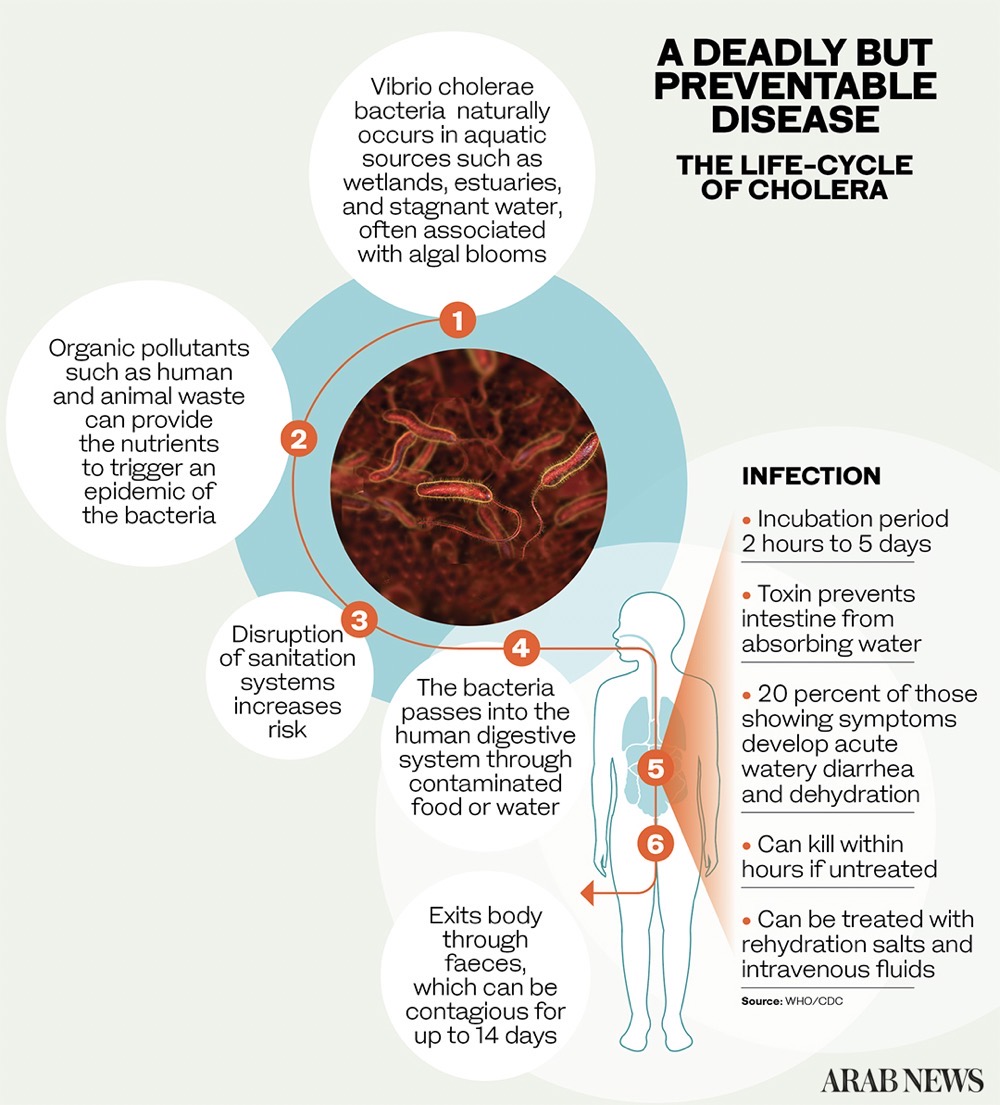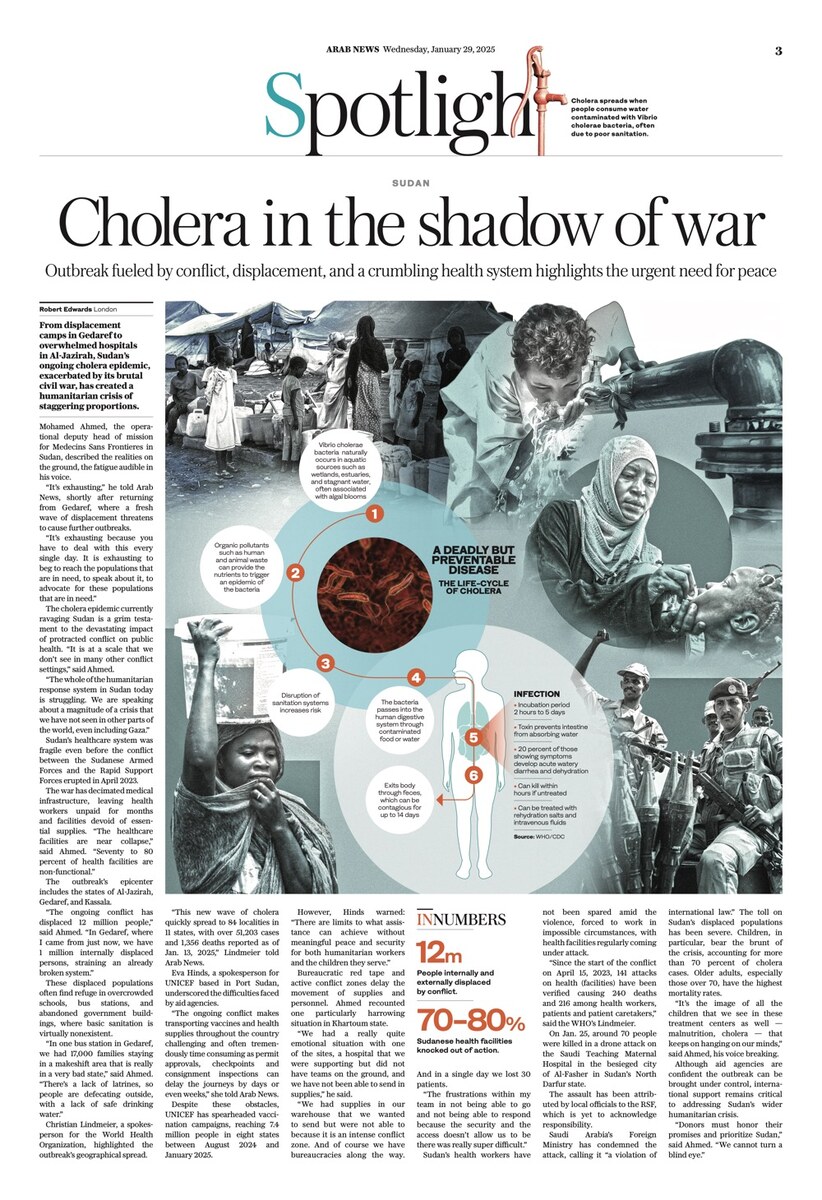LONDON: From displacement camps in Gedaref to overwhelmed hospitals in Al-Jazirah, Sudan’s ongoing cholera epidemic, exacerbated by its brutal civil war, has created a humanitarian crisis of staggering proportions.
Since the cholera outbreak was declared in August 2024, Sudan has recorded at least 50,000 cases and some 1,300 deaths. These numbers are likely an underestimate, however, due to challenges in accessing remote areas and gathering accurate data.
Mohamed Ahmed, the operational deputy head of mission for Medecins Sans Frontieres in Sudan, whose team has been working on the cholera response, described the realities on the ground, the fatigue audible in his voice.
“It’s exhausting,” he told Arab News, shortly after returning from Gedaref, where a 117 percent increase in cholera cases was recorded between October and November 2024, and where a fresh wave of displacement threatens further outbreaks.

People collect clean water provided by a charity organisation to people in Gedaref in eastern Sudan. (AFP/File)
“It’s exhausting because you have to deal with this every single day. It is exhausting to beg to reach the populations that are in need, to speak about it, to advocate for these populations that are in need.”
Cholera’s resurgence in Sudan is far from an isolated event. Historically, the country’s rainy seasons have fueled similar outbreaks, but this latest crisis has been exacerbated by unprecedented levels of displacement and a collapsing healthcare system.
The cholera epidemic currently ravaging Sudan is a grim testament to the devastating impact of protracted conflict on public health. “It is at a scale that we don’t see in many other conflict settings,” said Ahmed.
“The whole of the humanitarian response system in Sudan today is struggling. We are speaking about a magnitude of a crisis that we have not seen in other parts of the world, even including Gaza.”
Sudan has been engulfed in conflict for almost two years, severely limiting access to clean water, sanitation, and medical care. The nation’s healthcare system was fragile even before the conflict between the Sudanese Armed Forces and the Rapid Support Forces erupted in April 2023.

Cholera patients are treated at a clinic in Sudan's Red Sea State. (AFP/File)
The war has decimated medical infrastructure, leaving health workers unpaid for months and facilities devoid of essential supplies. “The healthcare facilities are near collapse,” said Ahmed. “Seventy to 80 percent of health facilities are non-functional.”
The outbreak’s epicenter includes the states of Al-Jazirah, Gedaref, and Kassala — areas already grappling with repeated waves of displacement.
“The ongoing conflict has displaced 12 million people,” said Ahmed. “In Gedaref, where I came from just now, we have 1 million internally displaced persons, straining an already broken system.”
These displaced populations often find refuge in overcrowded schools, bus stations, and abandoned government buildings, where basic sanitation is virtually non-existent.
“In one bus station in Gedaref, we had 17,000 families staying in a makeshift area that is really in a very bad state,” said Ahmed. “There’s a lack of latrines, so people are defecating outside, with a lack of safe drinking water.
“Cholera is largely spread from hand to mouth, so you come in with no food, no water to drink, and the situations they are in, staying in open buildings, crowded gathering sites that absolutely then propagate these kinds of epidemic diseases including cholera.
“And it is not only cholera that is spreading in these conditions. There are many preventable diseases. We are speaking about measles, we are speaking about other vaccine-preventable diseases.”
Christian Lindmeier, a spokesperson for the World Health Organization, highlighted the outbreak’s geographical spread.
“Fueled by heavy rains and flooding, destruction of health facilities, overcrowding and lack of access to clean water in displacement sites and within communities, this new wave of cholera quickly spread to 84 localities in 11 states, with over 51,203 cases and 1,356 deaths reported as of Jan. 13, 2025,” Lindmeier told Arab News.
“The cholera outbreak is occurring at a time when Sudan’s health system is severely weakened by the conflict that has been raging in Sudan for 21 months, causing severe access constraints and security risks where neither health workers nor patients can safely access health facilities or emergency health response can reach the people in need.”
Humanitarian organizations, including the MSF, the WHO, and the UN children’s fund UNICEF, have scrambled to respond to the crisis despite severe logistical and security challenges.
The MSF has established cholera treatment centers and oral rehydration points in hotspots such as Gedaref, which have saved the lives of countless people who would otherwise have quickly succumbed to dehydration.

A health worker wears a protective outfit at a hospital where Cholera patients are treated in Sudan's Red Sea State. (AFP/File)
Eva Hinds, a spokesperson for UNICEF based in Port Sudan, underscored the difficulties faced by aid agencies operating in this complex environment.
“The ongoing conflict makes transporting vaccines and health supplies throughout the country challenging and often tremendously time consuming as permit approvals, checkpoints and consignment inspections can delay the journeys by days or even weeks,” she told Arab News.
“Traveling across this sizable country, particularly during the rainy season, can also be taxing as roads get flooded and infrastructure gets washed away.”
Despite these obstacles, UNICEF has spearheaded vaccination campaigns, reaching 7.4 million people in eight states between August 2024 and January 2025.
However, Hinds warned: “There are limits to what assistance can achieve without meaningful peace and security for both humanitarian workers and the children they serve.”

Bureaucratic red tape and active conflict zones delay the movement of life-saving supplies and medical personnel. Ahmed recounted one particularly harrowing situation in Khartoum state, where clashes between the SAF and RSF have been particularly fierce.
“We had a really quite emotional situation with one of the sites, a hospital that we were supporting but did not have teams on the ground, and we have not been able to send in supplies,” he said.
“We had supplies in our warehouse that we wanted to send but were not able to because it is an intense conflict zone. And of course we have bureaucracies along the way. And in a single day we lost 30 patients.
“The frustrations within my team in not being able to go and not being able to respond or even responding from a distance because the security and the access doesn’t allow us to be there was really super difficult.”
INNUMBERS
• 12m People internally and externally displaced by conflict.
• 70-80% Sudanese health facilities knocked out of action.
Sudan’s health workers have not been spared amid the violence, forced to work in impossible circumstances, with health facilities regularly coming under attack.
“Since the start of the conflict on April 15, 2023, 141 attacks on health (facilities) have been verified causing 240 deaths and 216 among health workers, patients and patient caretakers,” said the WHO’s Lindmeier.
On Jan. 25, around 70 people were killed in a drone attack on the Saudi Teaching Maternal Hospital in the besieged city of Al-Fasher in Sudan’s North Darfur state.

Since the cholera outbreak was declared in August 2024, Sudan has recorded at least 50,000 cases and some 1,300 deaths. (AFP/File)
The assault has been attributed by local officials to the RSF, which is yet to acknowledge responsibility.
Saudi Arabia’s Foreign Ministry has condemned the attack, calling it “a violation of international law.”
Lindmeier called on all parties to respect the sanctity of healthcare and allow safe access to aid workers. “The WHO calls for cessation of hostilities by all parties in Sudan,” he said.
“Peace is overdue for Sudan. Without peace, lives, livelihoods, health and other social service systems will continue to be severely disrupted in the face of the rapidly deteriorating situation with transgenerational effects on the nation.
“We appeal for increased funding from the international community to enable us to support the provision of urgent lifesaving healthcare and outbreak response as we support and rebuild Sudan’s health system, which has been devastated by the conflict.”
The toll on Sudan’s displaced populations has been severe. Children, in particular, bear the brunt of the crisis, accounting for more than 70 percent of cholera cases. Older adults, especially those over 70, have the highest mortality rates.

A man disinfects a rural isolation centre where patients are being treated for cholera in Wad Al-Hilu in Kassala state in eastern Sudan. (AFP/File)
“It’s the image of all the children that we see in these treatment centers as well — malnutrition, cholera — that keeps on hanging on our minds,” said Ahmed, his voice breaking. “And every time we speak to people about this crisis, we see these images.”
The current Case Fatality Rate of 2.6 percent far exceeds the WHO’s recommended threshold of 1 percent, underscoring the dire need for intervention.
Although aid agencies are confident the outbreak can be brought under control, international support remains critical to addressing Sudan’s wider humanitarian crisis. Ahmed highlighted the need for sustained funding and access.
“We are approaching very challenging times, especially for the humanitarian community in 2025, with the magnitude of what we are seeing and as well the changes that we see in global dynamics,” he said.
“Donors must honor their promises and prioritize Sudan. We cannot turn a blind eye.”


























